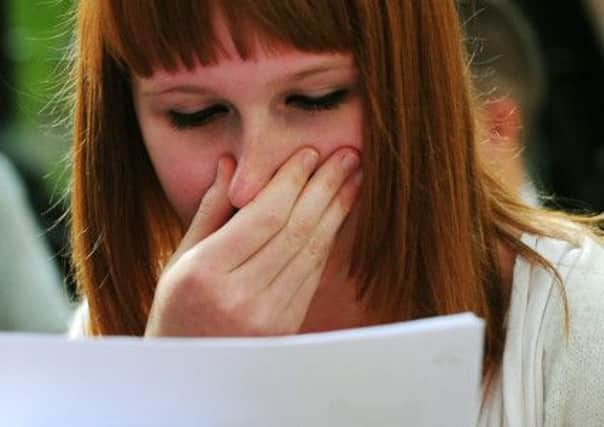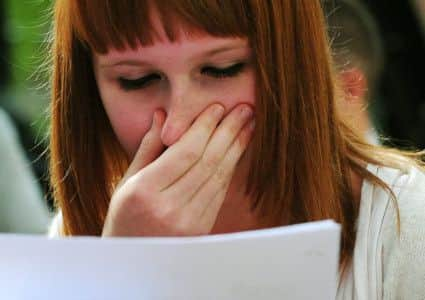Video: GCSE grades fall again with sharp drop in tougher science exam results


THE proportion of GCSEs awarded at least a C grade has fallen to 68.1 per cent down 1.3 percentage points from 2012 - the biggest fall in the exam’s 25-year history.
Official figures show a sharp drop in science - where exams have been toughened up - with 7.6 per cent fewer entries earning a C or better compared with last year.
Advertisement
Hide AdAdvertisement
Hide AdThe proportion of entries gaining top grades across all subjects has also fallen by 0.5 percentage points - with 6.8 per cent achieving a coveted A*.


Ofqual, the exams regulator said that there were more entries this year from 15-year-olds which meant comparisons with the previous year were difficult. It blamed tougher science exams for much of the overall decline.
It said that although A* to C grades had fallen overall there had been a slight increase in the numbers achieving these grades in the core subjects of English and maths.
Girls continued to out-perform boys, scoring higher results at A* and A*-C across all subjects.
Advertisement
Hide AdAdvertisement
Hide AdThe dip in national results comes as a Yorkshire education boss warned that head teacher’s confidence in GCSEs has been shaken by last year’s grading row.
Councillor Judith Blake, Leeds City Council’s executive member for children’s services, warned that last year’s dispute over English grades – which led to an unsuccessful legal challenge – has left some teachers feeling the system is working against their pupils.
Last year saw a drop in A* to C grades for the first time in the qualification’s history.
The results led to a High Court case after councils challenged the way in which two exam boards had moved the grade boundary between January and June in English. An alliance of schools, councils and pupils took the exam boards AQA and EdExcel and the regulator Ofqual to court in an attempt to get a judicial review to get work marked in June re-graded in line with the grade boundaries used in January.
Advertisement
Hide AdAdvertisement
Hide AdHowever the legal challenge was unsuccessful. Lord Justice Elias ruled Ofqual had done the best it could with a qualification which was structured unfairly and that grades would not be revised.
Coun Blake voiced fears the desire to stop grades improving year-on-year would result in more schools feeling their pupils had been unfairly treated this morning.
Ofqual operates a system which means they expected results to remain consistent from one year to another if the ability of the year groups remain similar. It has been credited with bringing to an end to “grade inflation” which saw GCSE grades improve consistently for more than two decades.
The downturn in results this morning has also been blamed on a major upheaval in the exams system with a rise in pupils entering maths GCSE early or multiple times, changes to science GCSEs and an increase in pupils taking international GCSEs (IGCSE) in certain subjects.
Advertisement
Hide AdAdvertisement
Hide AdThe latest statistics show a drop in the proportion of entries scoring at least a C in key subjects including English, maths and science.
:: In English, 63.6 per cent of entries gained a C or higher, down from 64.1 per cent last summer.
This comes amid a rise in the number of younger students taking GCSE English, the Joint Council for Qualifications (JCQ) said. This summer there were 61,000 more entries for the subject and of these more than two-fifths (41.9 per cent) were from pupils aged 15.
:: In maths, 57.6 per cent of entries scored an A*-C grade, compared to 58.4 per cent in 2012.
Advertisement
Hide AdAdvertisement
Hide AdJCQ said there had been “significant early and repeated entries” for maths, with more than half a million entries before the summer exams. While results for 16-year-olds - the age at which pupils usually sit GCSE exams - remained “virtually unchanged”, there was a decline in performance among 15-year-olds - those who are taking the exam early.
:: There has been a 7.6 percentage point fall in the proportion of entries awarded a C or higher in GCSE science. It follows a move by Ofqual to toughen up the qualifications after a 2009 report by the regulator found that the courses were too easy. This is the first summer that results have been given for the revamped GCSEs.
More pupils were entered for the three separate sciences - biology, chemistry and physics - but there was also a drop across the board in entries scoring decent grades. In biology, 89.8 per cent of entries got at least a C, down from 92.6 per cent last year, in chemistry 90 per cent of entries scored A*-C, down from 93 per cent, and in physics 90.8 per cent reached this standard, down from 93.2 per cent.
The decline in results for the separate sciences is partly down to bright students switching to IGCSE courses and an increase in the number of 15-year-olds, who tend to perform less well, taking the exams early, JCQ said.
Advertisement
Hide AdAdvertisement
Hide AdIt added that a general trend of more students opting for the three sciences, some of whom will have lower abilities in the subject, may also have had an effect.
:: The results also show a “dramatic” rise in the number of entries for modern foreign languages. French entries are up 15.5 per cent, German up 9.4 per cent and Spanish up 25.8 per cent.
This could be down to the introduction of the Government’s English Baccalaureate, which is awarded to pupils who score at least a C at GCSE in English, maths, science, history or geography, and a foreign language.